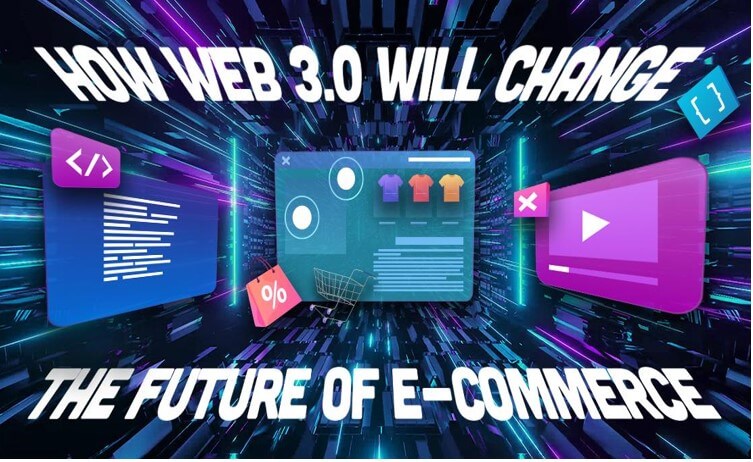How Web 3.0 Will Change the Future of e-commerce

How we do business has changed greatly because of the Internet, and eCommerce has become a big part of the global economy. Web 3.0 will change eCommerce even more by bringing in new technologies and ways of doing things that will make a big difference in how we shop online. In this article, we’ll talk about how Web 3.0 will change how eCommerce works in the future.
Web 3.0, also called the semantic web or the decentralized web is the next step for the Internet. Web 3.0 will be all about decentralization and blockchain technology, which differs from Web 2.0, which is about user-generated content and social media platforms.
How Web 3.0 Will Change the Future of eCommerce
Web 3.0 is the subsequent stage in the evolution of the internet, which emphasizes decentralized systems, blockchain technology, and smart contracts. This new technology is set to change the future of eCommerce by introducing several innovative features and capabilities that will enhance the online shopping experience. Here are some ways in which Web 3.0 will change the future of eCommerce:
Decentralized Marketplaces

Decentralized e-commerce platforms are one of the most important changes that Web 3.0 will bring to eCommerce. These platforms let buyers and sellers deal directly with each other without the need for middlemen. This cuts down on transaction costs and makes the market run more smoothly.
Smart Contracts
Smart contracts are another important part of Web 3.0. These contracts are coded into the blockchain, ensuring a transaction’s terms are followed. This will make eCommerce transactions more secure and clear, reducing the need for middlemen and speeding up the buying process.
Improved Security
With increasing cyberattacks and data breaches, eCommerce businesses are very worried about security. Blockchain technology, part of Web 3.0, will make eCommerce safer. By storing data on a decentralized ledger, companies can ensure customer data is accurate and private. This lowers the risk of data breaches and identity theft.
Enhanced Personalization
Web3 ecommerce website development will also be able to be more personalized. When businesses have access to more customer data and insights, they can offer more targeted and personalized shopping experiences. This makes customers happier and more loyal.
Increased Transparency
Transparency is key to eCommerce, and Web 3.0’s blockchain technology will help. Businesses can build trust with customers and suppliers by keeping a clear and unchangeable record of all transactions. This increases both transparency and accountability.
Improved Supply Chain Management
In eCommerce, Web 3.0 will also change supply chain management. Businesses can make the supply chain more open and efficient by using blockchain technology to track goods from when they are made to when they are delivered. This will lead to lower costs, faster delivery times, and more satisfied customers.
Greater Payment Options
Web 3.0 will also expand the payment options available to consumers regarding online purchases. Businesses can now offer their customers more payment options, reduce transaction fees, and simplify the payment process thanks to the proliferation of cryptocurrencies and blockchain-based payment systems.
Integration with IoT
Web 3.0 will facilitate communication between eCommerce platforms and IoT devices, which will play a significant role in the future of eCommerce. As a result, the customer’s shopping experience will be more tailored to his or her specific needs and preferences, increasing the likelihood of a positive outcome and inspiring continued loyalty.
New Business Models
Web 3.0 will enable eCommerce to use new business models, like tokenization and decentralized autonomous organizations (DAOs). With these models, businesses can find new ways to make money and disrupt traditional eCommerce models.
Challenges and Considerations
Web 3.0 has a lot of potential for the future of eCommerce, but there are also some challenges and things to consider. These include problems with regulations, the need to improve infrastructure, and the possibility of more cyber threats.
How can Web3 help small businesses?
Reduced Costs
Small businesses can save money with Web 3.0 technology because it eliminates the need for middlemen like banks and payment processors. This can make it cheaper for small businesses to do business online, allowing them to compete with bigger companies.
Increased Security
Small businesses can use blockchain-based payment systems and other security measures to make their Web 3.0 sites safer. This can help lower the risk of fraud and data breaches, which can be especially bad for small businesses.
Improved Marketing
Small businesses can use Web 3.0 technology to make their marketing campaigns more personalized and targeted. Small businesses can make better content and product suggestions using data from many places, like social media and IoT devices.
Access to Global Markets
Small businesses can use Web 3.0 technology to reach customers worldwide in new and growing markets. Small businesses can get more customers and make more money by using decentralized marketplaces and other Web 3.0 tools.
Greater Transparency
By putting a permanent record of transactions on the blockchain, Web 3.0 technology can help small businesses be more open and honest. This can help build trust with customers and suppliers while lowering the risk of disputes and chargebacks.
Overall, Web 3.0 technology could help small businesses compete by giving them access to new markets and technologies previously only available to larger businesses. Small businesses can be more competitive, save money, and give customers a better experience using Web 3.0.
Conclusion
Web 3.0 will transform the future of eCommerce by introducing new technologies and methods that will significantly alter how we shop online. Businesses can create more efficient and customer-centric eCommerce experiences with enhanced security, personalization, and accessibility.




